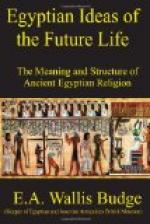1. “Thou shalt make neither
man nor woman to be afraid, for God is
opposed thereto; and if any man shall
say that he will live thereby,
He will make him to want bread.”
2. “As for the nobleman who possesseth abundance of goods, he may act according to his own dictates; and he may do with himself that which he pleaseth; if he will do nothing at all, that also is as he pleaseth. The nobleman by merely stretching out his hand doeth that which mankind (or a person) cannot attain to; but inasmuch as the eating of bread is according to the plan of God, this cannot be gainsaid.”
3. “If thou hast ground to till, labour in the field which God hath given thee; rather than fill thy mouth with that which belongeth to thy neighbours it is better to terrify him that hath possessions [to give them unto thee].”
4. “If thou abasest thyself
in the service of a perfect man, thy
conduct shall be fair before God.”
5. “If thou wouldst be a wise
man, make thou thy son to be pleasing
unto God.”
6. “Satisfy those who depend
upon thee as far as thou art able so to
do; this should be done by those whom
God hath favoured.”
7. “If, having been of no account, thou hast become great; and if, having been poor, thou hast become rich; and if thou hast become governor of the city, be not hard-hearted on account of thy advancement, because thou hast become merely the guardian of the things which God hath provided.”
8. “What is loved of God is obedience; God hateth disobedience.”
9. “Verily a good son is of the gifts of God.” [Footnote: The text was published by Prisse d’Avennes, entitled Facsimile d’un papyrus egyptien en caracteres hieratiques, Paris, 1847. For a translation of the whole work, see Virey, etudes sur le Papyrus Prisse, Paris, 1887.]
The same idea of God, but considerably amplified in some respects, may be found in the Maxims of Khensu-Hetep, a work which was probably composed during the XVIIIth dynasty. This work has been studied in detail by a number of eminent Egyptologists, and though considerable difference of opinion has existed among them in respect of details and grammatical niceties, the general sense of the maxims has been clearly established. To illustrate the use of the word neter, the following passages have been chosen from it:[Footnote: They are given with interlinear transliteration and translation in my Papyrus of Ani, p. lxxxv. ff., where references to the older literature on the subject will be found.]—
1. “God magnifieth his name.”
2. “What the house of God hateth is much speaking. Pray thou with a loving heart all the petitions which are in secret. He will perform thy business, he will hear that which thou sayest and will accept thine offerings.”
3. “God decreeth the right.”




